The pro-life options in Toledo

This is the third of a limited series about reproductive healthcare options and care for women in the Toledo area.
The pro-life/pro-choice debate goes back as far as most of us can remember. As political polarization increases in the U.S., so does the gap between members of these conflicting ideologies.
In his book, Persuasive Pro-Life, pro-life advocate Trent Horn explains why the stakes are so high for people on either side.
“If pro-choicers are correct, and abortion is a routine medical procedure, then pro-lifers oppress women and falsely accuse them of homicide. But if pro-lifers are correct, and abortion ends the life of a human being, then pro-choicers are guilty of defending the killing of millions of people.”
While this debate is certainly a hot topic, for many of the pro-life facilities in Toledo, the issue is less about partisan politics and more about caring for a pregnant woman in need and safeguarding a life.
Heartbeat of Toledo
Executive director of Heartbeat of Toledo Gina Borino said the nonprofit has brought together employees and patients of all different backgrounds, religions and political ideologies.
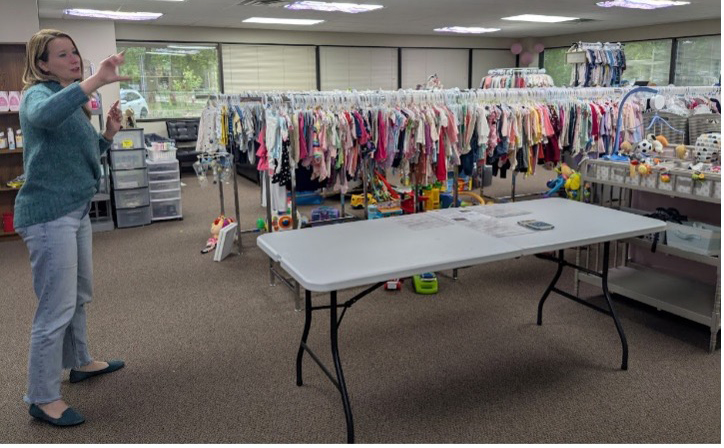
Heartbeat is a pro-life organization in Toledo that provides free, confidential services to those who are pregnant, think they may be pregnant or have a child under the age of two. It has three programs: Your First Look, Heart to Heart and Catalyst.
- Your First Look provides free and confidential pregnancy testing, ultrasounds and STI testing
- Heart to Heart offers prenatal and parenting education, including free classes that can be taken in-person or online, and can explain changes to the body during pregnancy, the delivery process, self-care postpartum and childcare postpartum
- Catalyst is a program that targets younger demographics and teaches individuals how to build self-worth and cultivate healthy relationships.
These various programs all have a different focus, whether medical or personal.
“Some women will come in and say, ‘I want this baby, but it’s the finances, the relationship, housing, childcare.’ Those reasons keep her from feeling like she can go through the choice that she really wants to make. So, it’s not about changing her mind. It’s about meeting the resources that allow her to have that choice,” Bonino said.
Heartbeat provides free clothing and other resources for clients, such as formula, baby bottles, nursing pumps, blankets, shampoos, toys and more.
Bonino said clients who come to Your First Look can choose to see their ultrasound photos and hear the fetal heartbeat, or to decline both.
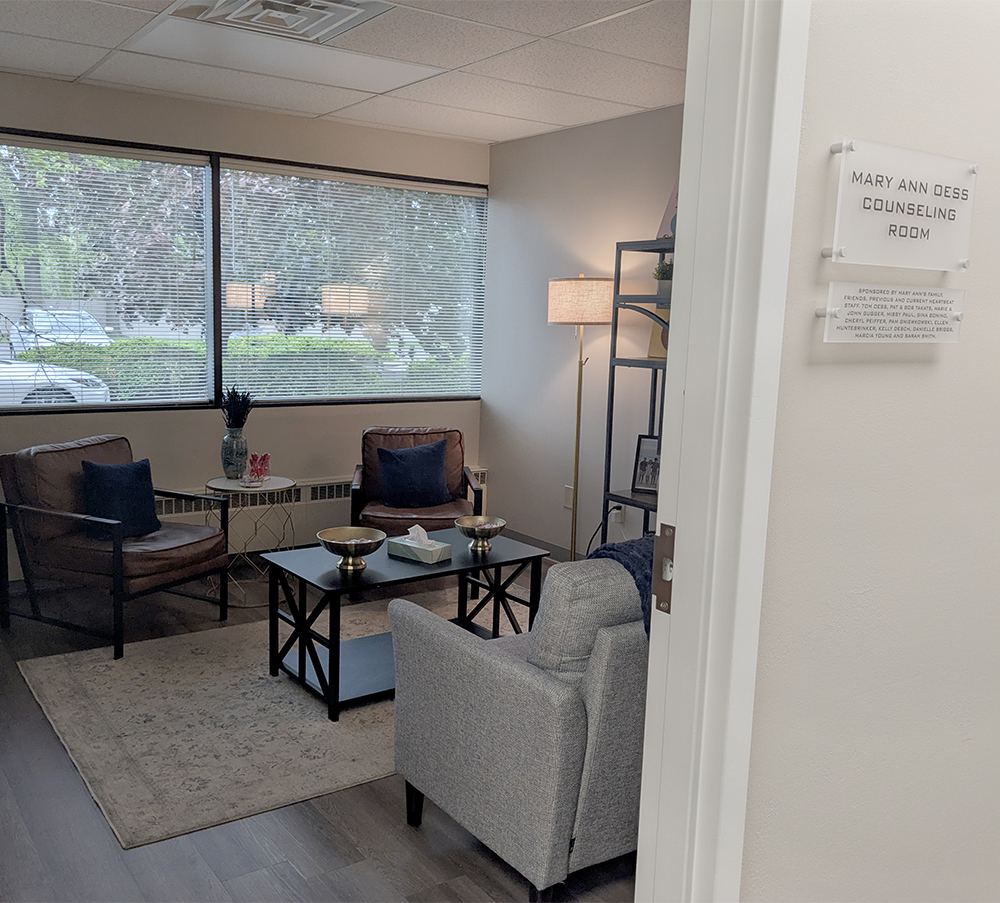
In addition to these services, Heartbeat also offers counseling, which presents their clients with all three options once a positive pregnancy is confirmed: parenting, adoption and abortion.
“We have a very come-as-you-are, non-judgmental, non-coercive space,” Bonino said.
She emphasized that, unlike other pro-life pregnancy centers, Heartbeat is not affiliated with a religious group.
“That does not mean that we don’t have faith-filled people here, or that we don’t view it as important,” Bonino said. “I kind of view this [Heartbeat] as the safety net that catches those women that may fall through the cracks, that won’t go to an organization because they know they’re religious.”
Clients are welcome regardless of income or relationship status and can come at any point from suspected pregnancy to having a child up to two years of age.
Heartbeat also recently opened a location in Maumee, which they rent from St. Joseph Catholic Church, where the Heart to Heart program offers classes (like cooking classes), and there is an extension of Heartbeat’s store, which has free supplies for clients.
With so many women feeling challenged and alone in their pregnancy, Bonino hopes Toledo can continue to grow in support for women in need.
“One day, we can get the childcare covered, we can get housing covered. What other ways can we, as Toledo, come together to help these moms and support them when they are in these situations?”
Laurie’s Place
Laurie’s Place is another pro-life resource center in Toledo that helps fill one of those care gaps.
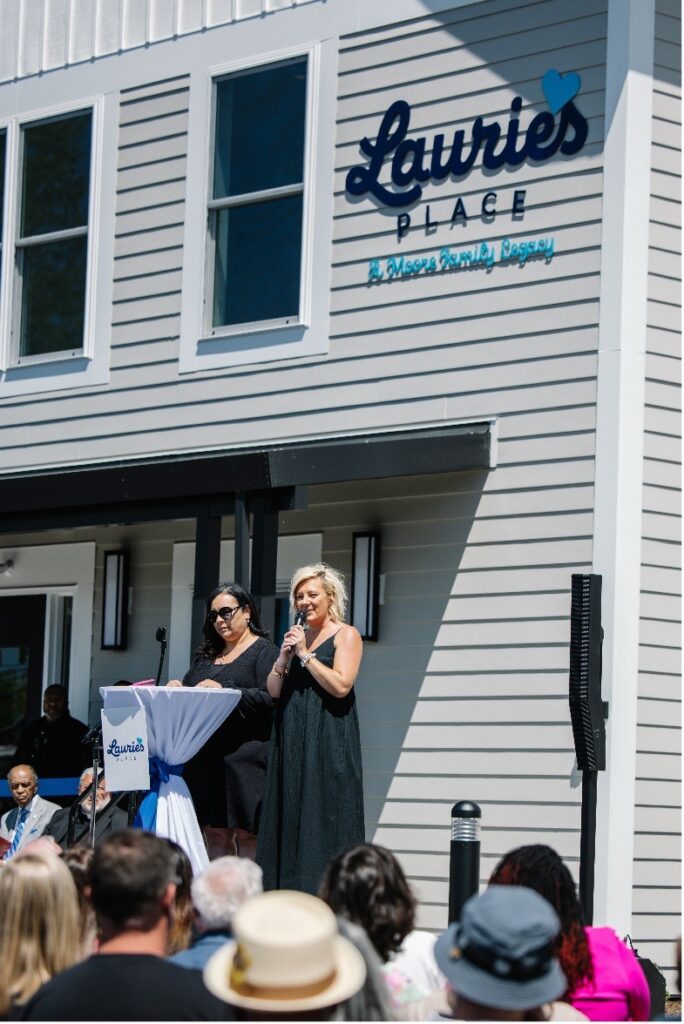
Laurie’s Place opened on May 9 with more than 500 people attending the grand opening. The facility is a collaboration between The Pregnancy Center and Mom’s House that helps provide free childcare for low-income women pursuing any level of school degree.
The goal of Laurie’s is to make keeping and raising a child easier for women with lower incomes, and to reduce their burden as they finish their schooling.
Programming for Laurie’s begins in August, with applications currently available for the start of the school year.
In addition to childcare, Laurie’s also offers pregnancy and parenting classes and mental health counseling.
Executive director of the Bella Vita Network, Savannah Marten, said Laurie’s Place was first conceptualized during a meeting between Marten and the director of Mom’s House.
“We kind of talked about it in the context of, ‘How do we make the path to parenthood sustainable?’” Marten said. “We [The Pregnancy Center] wanted to reach out and actually form partnerships with these other amazing agencies in our community and build a really great referral network so that we could easily help our moms navigate this.”
The heart of the movement
“In a polarized world over a polarized topic like abortion, we are led to believe that it is impossible for us to cross religious boundaries, political boundaries. And we saw at the grand opening that people of different faiths, different denominations, different political associations, all came together.
“And we believe that’s actually what brings change in the community, is when we’re willing to say there’s more that we agree on together. We live in a world that wants to pit us and leave us in separate corners. And I think Laurie’s Place proves that our community is better when we work together,” Marten said.
In 2023, there was a 26 percent decrease in the number of abortions performed in Lucas County compared to the previous year, according to the Ohio Department of Health. Lucas was also the only county in Ohio that decreased its abortion numbers from 2022, compared to other counties that also regularly perform abortions.
For 40 Days For Life sidewalk counselor Joan Stowell, this means the pro-life movement in Toledo is doing its job.
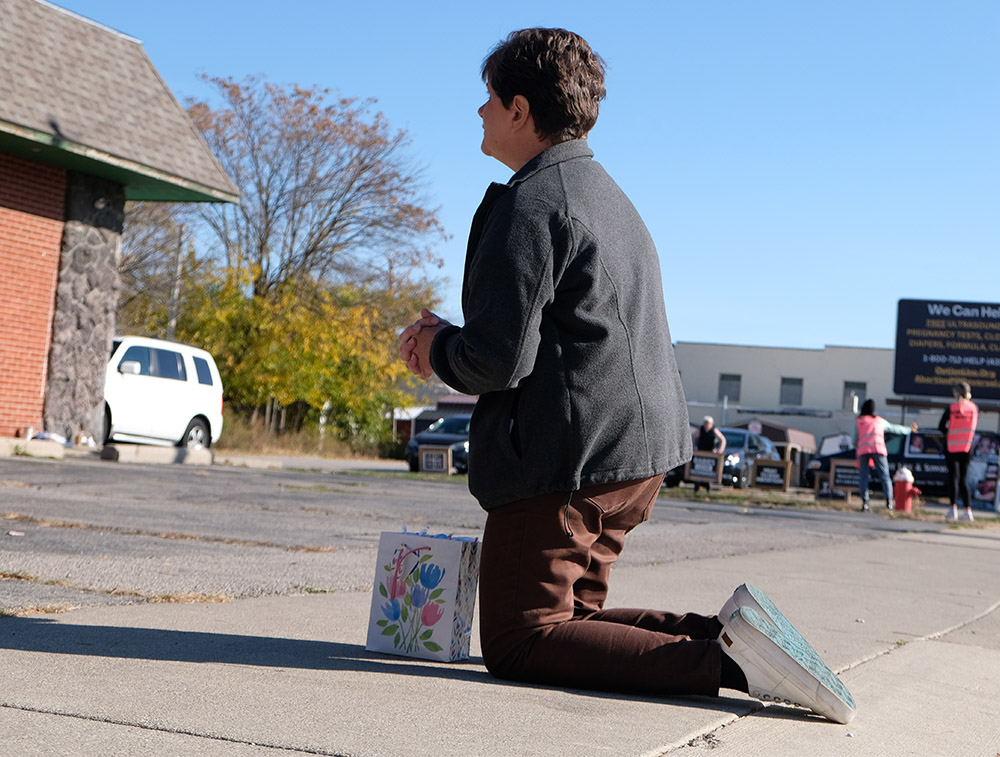
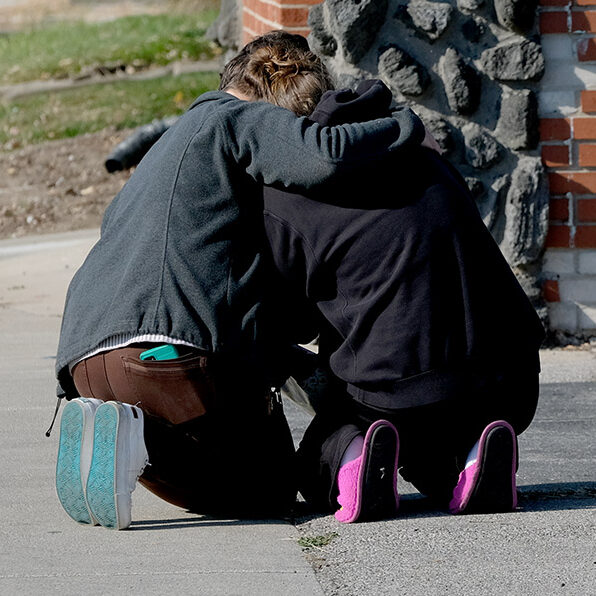
“I believe that all life has value and it’s a gift that our creator gave us. The decision of abortion, I’m sure, is one of the hardest decisions any mother made,” Stowell said. “It’s a very painful process and very difficult. And we just want them to know that they are loved and there’s help out there, and if they want it, we will be there for them.”
Stowell has been a sidewalk counselor for the past seven years and is present at the Toledo Women’s Center about 90 percent of the time it’s open.
“[We] pray and offer love and hope and assistance to people that are contemplating abortion. We feel that they are our neighbors, our brothers and sisters that need help and so we offer a loving presence out there for those that want our assistance,” Stowell said.
She’s not the only one who prays outside, however. 40 Days For Life has a group of about 80 other volunteers who come to pray outside the clinic and counsel clients entering, whenever the Toledo Women’s Center is open, rain or shine.
“We want to make sure that people that need assistance, whether it’s financially or emotionally or spiritually, they have somebody to talk to. We like to slow them down enough to know that there is a free ultrasound and a free consultation at our pregnancy resource centers, and that there are plenty of people that want to help; they don’t have to do this alone,” Stowell said.
To mothers without vehicles, parents who can’t pay rent and families struggling to get by on food stamps, Stowell said the pro-life volunteers help in any way they can to make supporting a child easier.
“The world would be a different place if we learn to help each other instead of judge them or accuse them. And a lot of people have a false perspective of what we do out there. We’re not there to judge them,” Stowell said. “We’re there to offer help and love and prayer and assistance if they need it. And if they don’t want it, ultimately that’s their choice.”
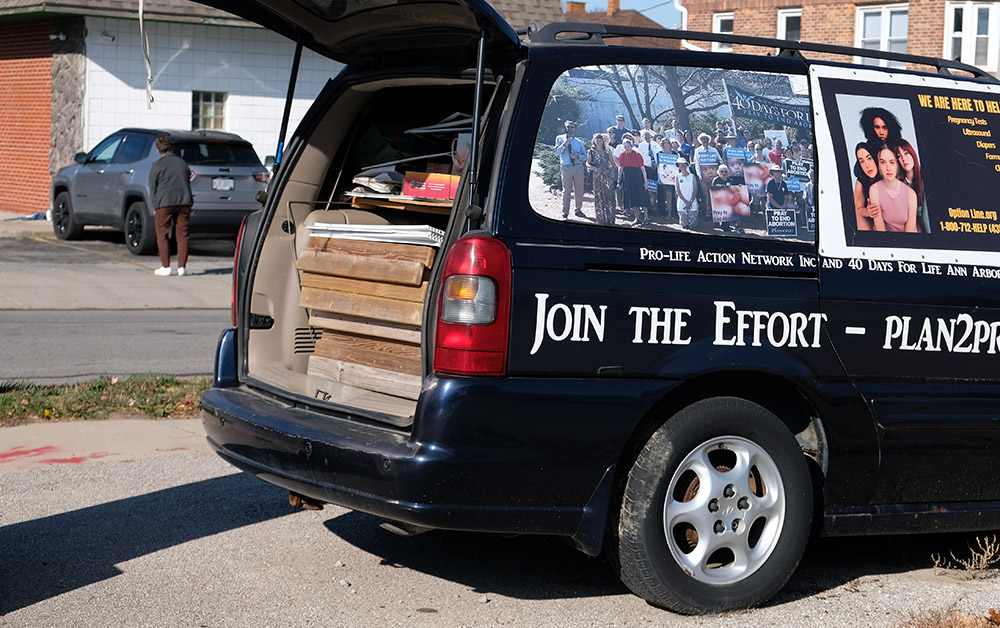
A testimony
“I hope resources like this don’t go away under the current administration,” said Heartbeat of Toledo client Brittnay.
Despite being personally pro-choice, Brittnay emphasized the benefits of local life-affirming pregnancy centers.
“Heartbeat is a really good program with people who really care,” Brittnay said. “They’re dedicated.”
When she first discovered she was pregnant, Brittnay called pregnancy centers in the area, hoping to be set up with resources and connected to an obstetrics nurse (OB).
“Everything was really quick paced,” Brittnay said.
From her first appointment to the approach of her daughter’s first birthday next month, Brittnay said Heartbeat has been there to provide her with the resources she needs.
“When I run out of diapers, my Heartbeat appointment comes up,” Brittnay said.
Not only have free pregnancy and parenting resources benefited her financially, but she said these services have also helped her be a better parent and increase the quality of her daughter’s childhood.
“Heartbeat cares, and it’s really kind of them to do so,” Brittnay said.
Though many think of pregnancy resource centers as political in nature, for the staff and clients, they are community resources that exceed partisan politics.
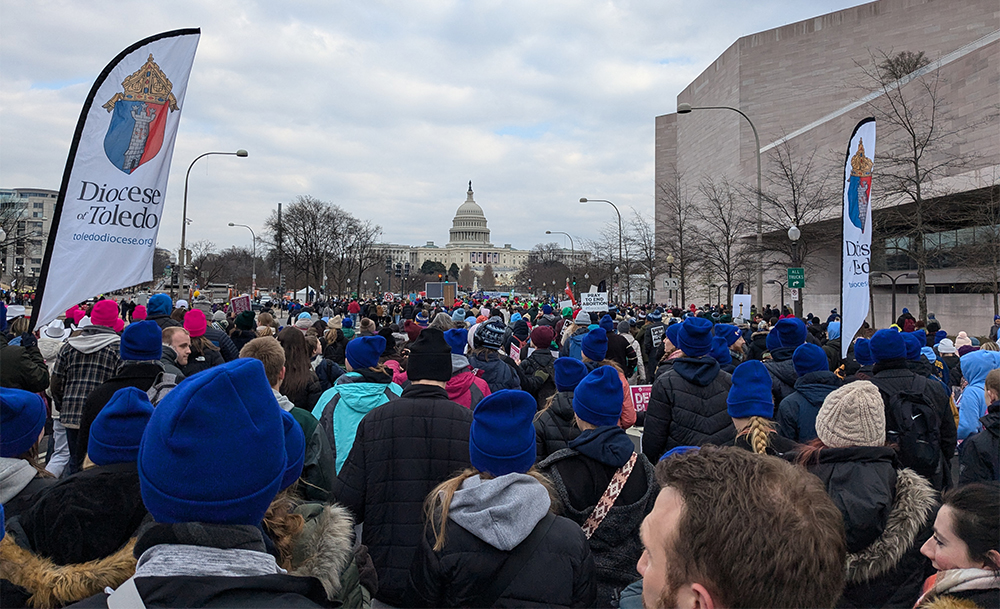
Abortion Fact Sheet
- In 2024, there were more than 1 million abortions in the U.S., according to the Guttmacher Institute.
- There are four types of abortion procedures: Medical/chemical abortions, vacuum aspiration, dilation and evacuation (D&E) and labor induction abortions. Information about all four types, including advantages and disadvantages, can be found on the Medical News Today website.
- The 2022, Dobbs v. Jackson Women’s Health Organization Supreme Court case ruled that abortion is not a constitutional right, leaving the decision to legalize abortion up to the states. Click here for more information.
- According to the National Library of Medicine:
- [abortion] Complication rates depend on the procedure type, gestational age, patient comorbidities, clinician experience and, most importantly, whether the abortion was performed in a safe or unsafe manner.
- The majority of complications associated with abortion are minor, but major complications can occur including severe hemorrhage, endometritis, non-uterine organ injury, and disseminated intravascular coagulation. A study evaluating 54,911 abortions found an overall complication rate of 2.1 percent. Medication abortions had a 5.2 percent complication rate (4.9 percent minor, 0.3 percent major), with rates of 1.3 percent in the first trimester and 1.5 percent for the second trimester. First-trimester aspiration had a complication rate of 2.3 percent.
Toledo native serves up a Number Six with Cheese food review show
Some things just don’t add up.
For instance, how does a young man who grew up in West Toledo earn an electrical engineering degree, never use it, become best pals with a sportswriter from Redford, Mich., and ultimately have success as a food reviewer on YouTube?
Corey Wagner, a 2005 graduate of Cardinal Stritch High School, joined the United States Air Force as a computer, network, switching and crypto graphic technician. He spent a year of boot camp in San Antonio, Texas, and was sent to Germany. He lived in Qatar for four months and moved to Idaho after four years in the military.
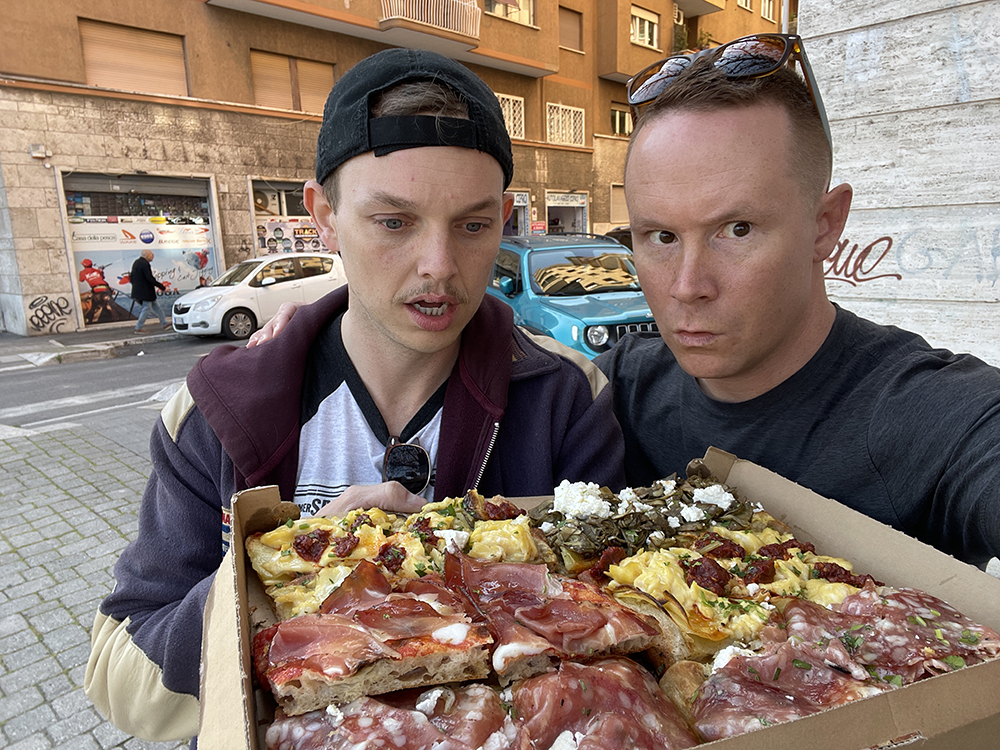

Wagner, 38, returned to Toledo and enrolled at the University of Toledo, earning an electrical engineering degree in 2014. Comedy, however, was in his blood. He moved to Chicago and began attending The Second City comedy club.
Enter Sean Ely, 38, who met Wagner at Second City in 2016. The two often did improv and comedy sketches together and realized they had the same interests.
“We hit it off right away,” Wagner said. “We both came from pretty similar cultural places. Sean is from [suburban] Detroit and I’m from Toledo, and we both came from Catholic high schools. We went to Second City, we both played sports in high school and we liked razzing each other. We had similar sensibilities.”
Ely earned a bachelor’s degree in journalism from Michigan State University in 2009 and became a sportswriter. He wrote for the Lansing State Journal and freelanced for the Detroit Free Press and the Detroit News before moving to Oklahoma.
“Journalism was my life,” Ely said. “I moved to Chicago in 2013 and got a job at the Tribune. I got to do all the things I wanted to do. That’s where I met my wife. When I was at the Tribune I started taking classes at Second City and met Corey. We did sketch comedy on stage every night.”
Ely, who began making YouTube videos in 2011, said he left the Tribune in 2015 to start his own social media marketing business.
“I wanted to be my own boss and do my own thing,” he said. “Number Six With Cheese started during that. I told Corey we could do these funny food reviews, and Number Six fell in with the timing of that.”
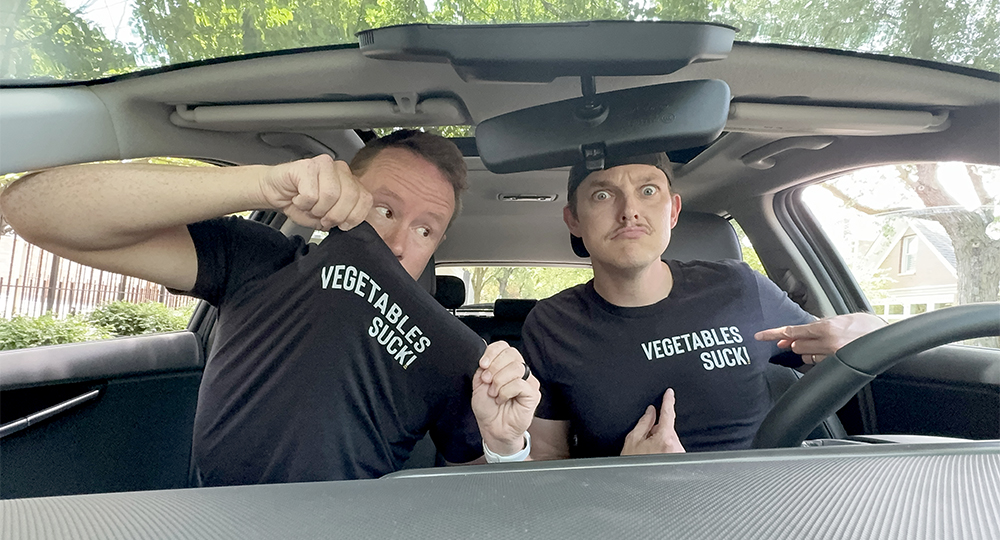
Ely came up with an idea to do food reviews inside their car, pitched the idea to Wagner, and their Number Six With Cheese vlog was born. Their first review, in 2016, was called “Grilled cheese stuffed crust pizza at Pizza Hut.”
Wagner estimates he and Ely, who both live in Chicago, have since done more than 1,500 Number Six vlogs in the last eight years, and they now have more than 45,600 subscribers. Many of their vlogs have more than 35,000 views on YouTube.
“The way it started, the first felt like a one-off,” Wagner recalled. “We had made a sketch comedy channel and Sean said ‘let’s do a food thing.’ We didn’t know if we were going to keep doing it. We were throwing darts at a board to see if it worked. We did another one two weeks later and kept ramping up another one, and it wasn’t that long before we were doing 4-5 a week.
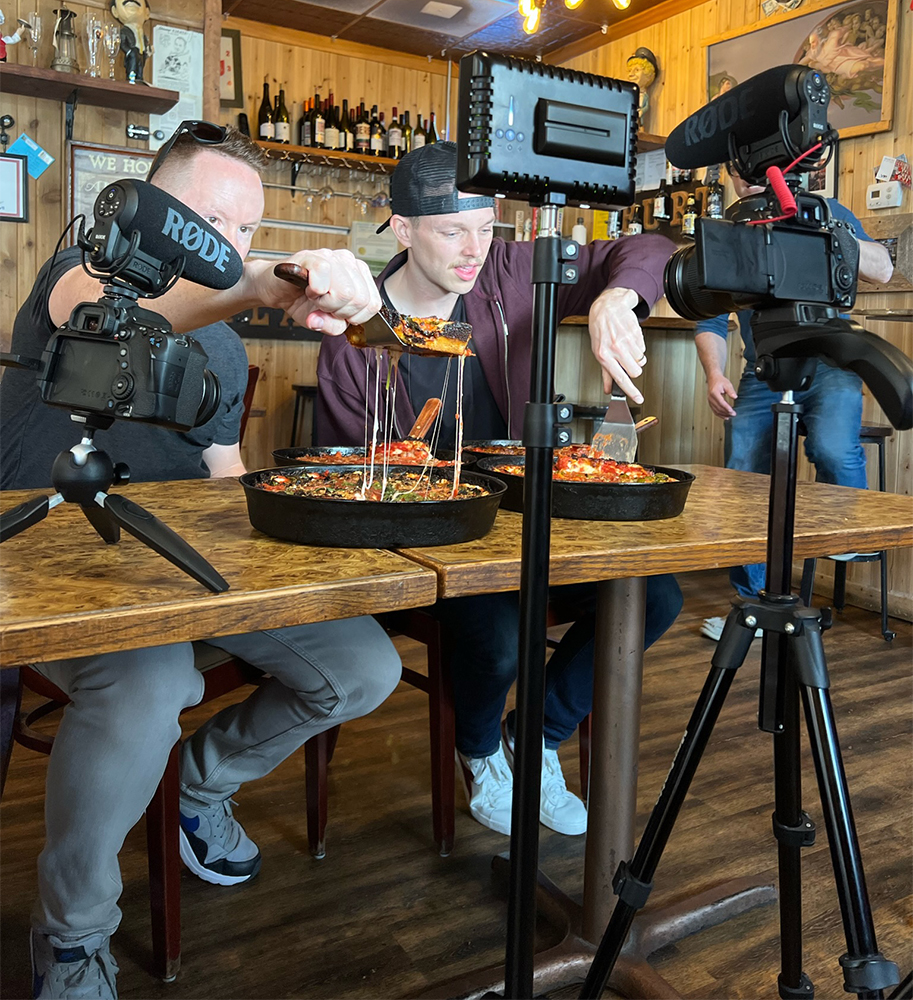
“Within the first three months, we had people pitching us for TV shows,” Wagner added. “Because it was doing so well so early, we were all in. We were just having fun in the beginning. When I graduated high school, YouTube wasn’t even a thing. I was going down the comedy path making comedy short films for YouTube.”
Number Six With Cheese has a clever premise. Wagner and Ely taste test various food — they eat a lot of pizza, burgers, chicken and hot dogs — from national and local restaurants and give their opinions and grades.
The hook: They film the videos while sitting in the front seat of Wagner’s wife’s car — which is parked, of course — and Wagner always drives. Wagner’s wife, Kylie Hayes, is also from Toledo.
“I never really knew how long it would go,” Ely said. “We did the first one and got such a good response. I had a YouTube channel already and we uploaded it there. People at Second City said, ‘You two in the car together is good.’ In the first year, we signed a holding deal with an agency that wanted to make a TV show about us … we’re not going to stop doing this. It never made sense to stop, and now it’s been nine years.”
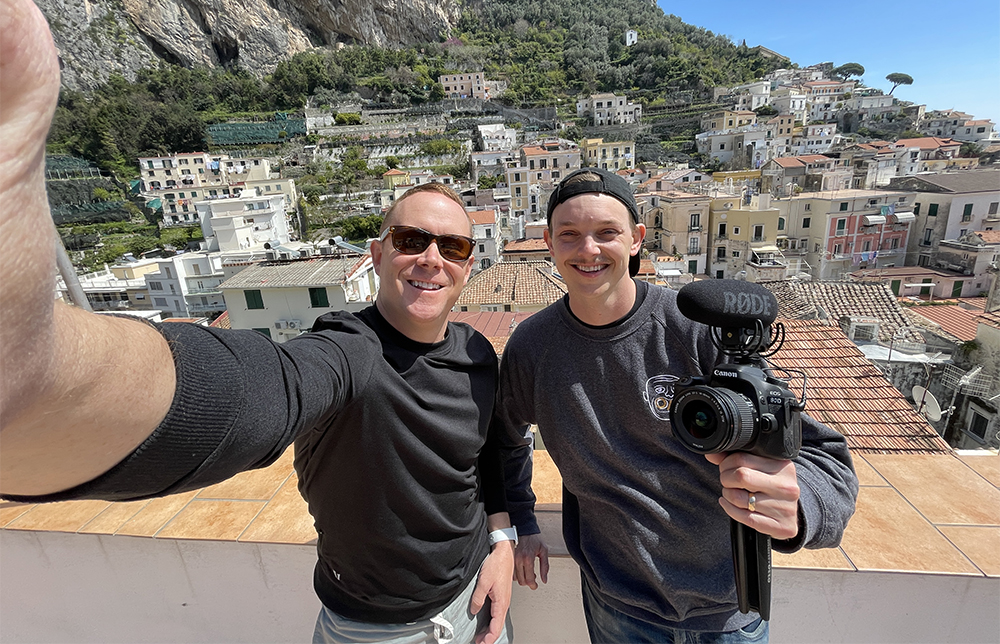

Wagner and Ely were posting as many as five videos a week for several years, but now they post two per week. They have added an Eat Local Chicago channel, where they only review Chicago-area restaurants. Wagner and Ely also have their own personal food/travel YouTube vlogs (CoreyWagnerChicago and HeySeanEly).
“It’s pretty crazy,” Wagner said. “Eat Local has 7,000 subscribers and we have our core audience of 5,000 to 8,000. It blows my mind that four days a week we put something out and 5,000 people are watching it. That’s a lot of eyeballs.”
Wagner and Ely have also partnered with companies to produce their own hot sauce and clothing merchandise. They have filmed several Number Six With Cheese videos in Toledo, but not for a few years because of their busy schedules.
The two have done food reviews on Toledo-area restaurants such as Pizza Cat, Rudy’s Hot Dogs, Tony Packo’s, Barry Bagels, J&G Pizza Palace, Netty’s and Inky’s Pizza. Seven years ago, Wagner and Ely were guest judges at Pizza Palooza at Centennial Quarry in Sylvania.
All of their videos come across as fun, informative, entertaining and unpretentious. Wagner and Ely’s on-camera chemistry and sense of humor are undeniable. They are just as comfortable talking to each other as they are their audience.
Ely said he and Wagner get asked if they are brothers “all the time.”
“We got along right away as friends,” Ely said. “We laughed at the same things; we both had non-traditional jobs and we hung out during the day. We got to do so many reps together and we played into each other’s character. It becomes second nature to do it.”
Banned Israeli-Palestinian film shown at Maumee Indoor Theater
MAUMEE – The Israeli-Palestinian film No Other Land was shown at the Maumee Indoor Theater to a crowd of a few hundred over Memorial Day weekend.
Despite winning the 2024 Oscar for best documentary in March of 2025, no American streaming platforms or mass distribution have picked up No Other Land, forcing it into independent theaters in the United States.
This embargo on the documentary prompted the Media Decompression Collective (MDC), led by its founder Amjad Doumani, to approach the Maumee Indoor Theater to show the film, with a plan to show it again later in the summer season.
The documentary itself follows Basel Adra, a Palestinian activist, as he tries to get the world to pay attention to the Israeli settlers destroying his small Palestinian community in Masafer Yatta, in the occupied West Bank.

Doumani showed the 95-minute film, and then put together a panel to answer people’s questions after the film. The panel consisted of himself, as a Palestinian-American; Terry Lodge, a local peace activist and attorney; Mechelle Zarou, an immigration lawyer and 1st generation Palestinian-American; and Maha Zeidan, a member of the Palestinian American Bar Association with her J.D. in law from the University of Toledo.

When Doumani put together the event, he said he wanted the panel to help explain the history of what is happening between the Israeli government, Israeli settlers and Palestinians living in the occupied West Bank and Gaza, as No Other Land does not branch out beyond the small community of Masafer Yatta.
No Other Land directors at the Oscars
All four directors, two Israeli and two Palestinian, accepted their Oscars at the Academy Awards, and Yusuf Abraham, an Israeli journalist and one of the directors for the film, spoke plainly about why the team worked from 2019 to 2024 to produce the film.
“We made this film, Palestinians and Israelis, because together our voices are stronger,” Abraham said, and called for the end of the Israeli assault on Gaza and for the release of the remaining Israeli hostages.
“When I look at Basel, I see my brother, but we are unequal,” he continued. “We live in a regime where I am free under civilian law, and Basel is under military laws that destroy his life and he cannot control.”
Abraham said, “There is a different path, a political solution without ethnic supremacy, with national rights for both of our people. And I have to say as I’m here [in the U.S.] the foreign policy of this country is helping to block this path.”
“Why?” he asked. “Can’t you see that we are intertwined? That my people can be truly safe if Basel’s people are truly free and safe.”
“There is another way,” he resolved.
A brief look at settlements and settlers
Masafer Yatta is just one of many areas in the occupied West Bank, a 2,183 square mile area between the Jordan River and the Mediterranean Sea under Israeli occupation since 1967.
After the Six Day War in 1967, the first Israeli settlement was constructed, and since then Israeli settlers have forcibly displaced Palestinians living in the West Bank in a modern day effort of ethnic cleansing. The international community has condemned these settlements as they violate the Fourth Geneva Convention, designating them as illegal.
Israeli settlers believe they are creating a buffer for Israel while decreasing the viability of a Palestinian state in the future, which they see as a threat to Israeli sovereignty. Now it is estimated there are about 700,000 settlers in the Occupied West Bank, with well over a hundred settlements, some estimate as high as 250 settlements.
No Other Land shows a rare glimpse of what the displacement of Palestinian communities looks like on the ground level.
Following the acclaim of the film, the Israeli military has barred Adra, who has attempted to lead a press tour into Masafer Yatta.
After viewing the film at the Maumee Indoor Theater, members of the public came out of the theater with glazed looks of astonishment, including Mike Strom, a Jewish-American, who reactively said to the Toledo Free Press at the beginning of an interview, “Hello, my name’s Mike, and I just watched a movie. And it made me sad,” before expounding more in the YouTube video.
Inside Toledo City Council: June 3
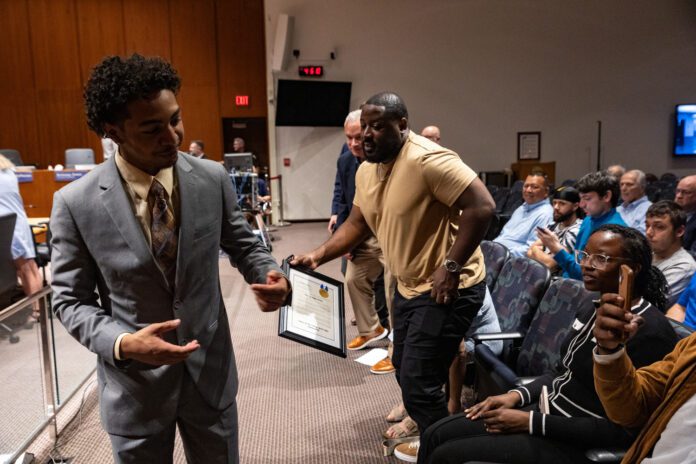
Inside Toledo City Council is an ongoing TFP series highlighting the public functions of the 12-member council so citizens can become more civically involved.
TOLEDO – Three resolutions started off Tuesday’s Toledo City Council meeting, whose most controversial ordinances were placed on “hold” so council members could further investigate them.
All council members were in attendance with the exception of Brittany Jones (at-large), and the meeting officially began with an invocation from Rev. Aaron Baughman of Holy Trinity Lutheran Church. The invocation focused on the benefit and power of diversity, as told through a reimagining of the story of the Tower of Babel from the Bible.
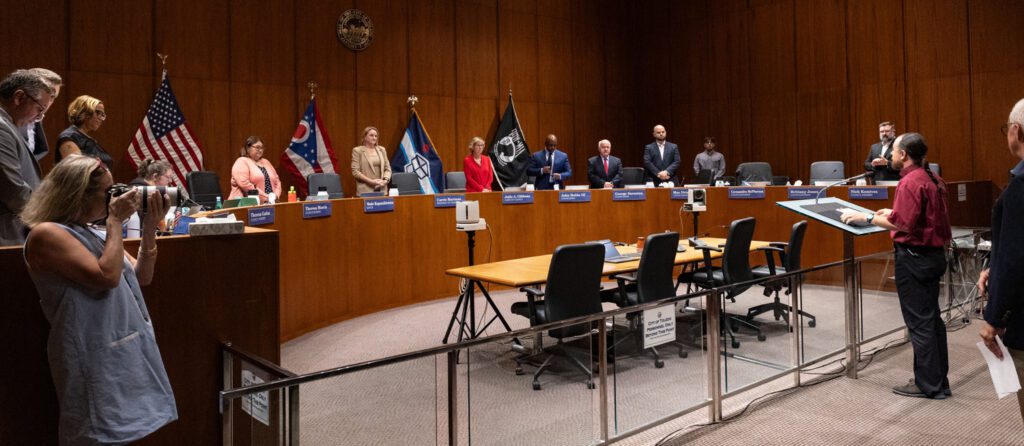
Old Orchard Pride
Next, a neighborhood team, the Old Orchard Neighborhood Association, took to the podium, and advertised their Garden Tours happening this Sunday, June 8. The tours are priced at $10 per person, happen from 10 a.m. to 5 p.m. and all the proceeds from the tours go towards the beautification of the Old Orchard neighborhood.
Sam Melden (District 5), whose district includes the Old Orchard neighborhood exclaimed that “this is one of the coolest events in the city, and it’s a great example of what happens when neighbors care so deeply about their neighborhood.”
One day before the garden tours, on June 7, Old Orchard is featuring a garage sale day from 9 a.m. to 3 p.m.
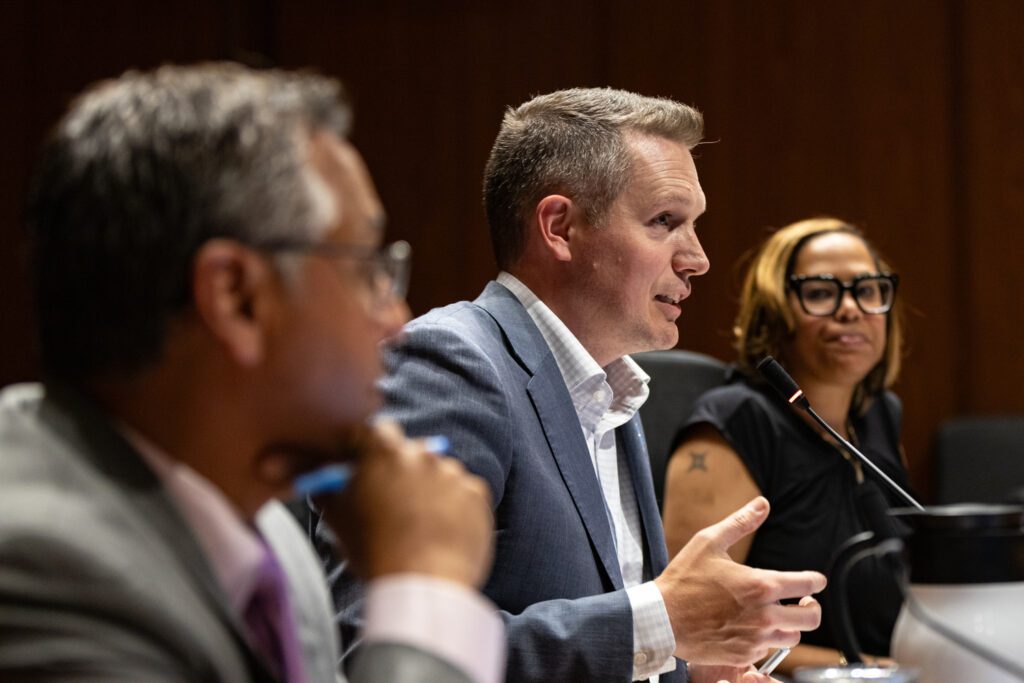
Ohio Youth of the Year
Council then took pride in recognizing high school senior Tyreese Blue II, who won the 2025 Ohio Youth of the Year award for the Ohio Alliance of Boys & Girls Clubs.
The award was announced in early April of this year and resulted from Blue’s volunteer dedication and service to the Boys & Girls Clubs of Toledo.
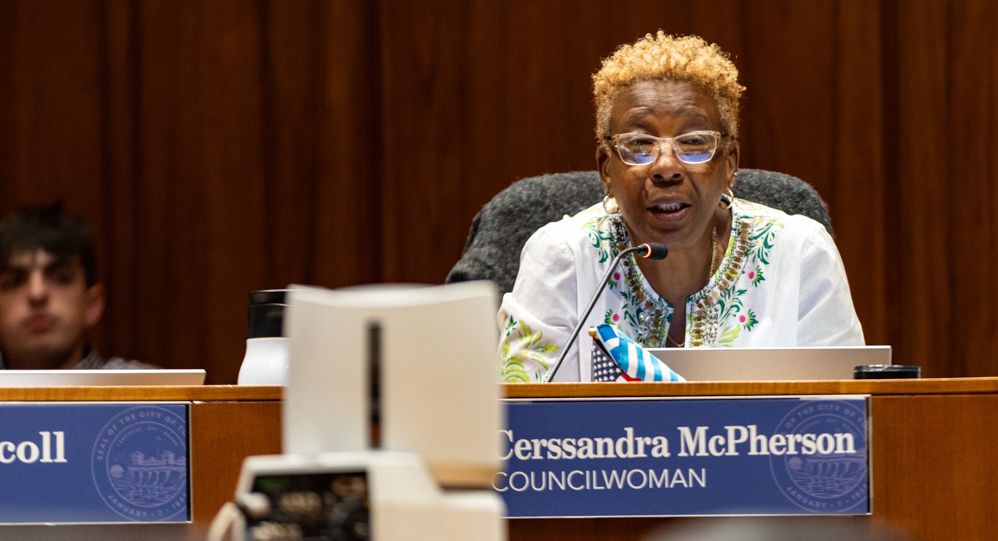

Blue plans on attending the University of Toledo, where he will have already collected enough credits to enter as a junior in undergraduate studies. The 17-year-old plans on majoring in construction engineering technology.
Multiple council members had words of encouragement for Blue, including Nick Komives (at-large), who hoped Blue would “stick around the city.”
During 13 ABC’s Rising Star segment, Blue said he intended on reinvesting in his family here in Toledo. “They put in so much work to put me in this position, I just want to give back to them in whatever way I can.”
Council members Vanice Williams (District 4), Cerssandra McPherson (at-large), Melden (District 5), and George Sarantou (at-large) all added their praises to Blue for his accomplishments and contribution to the community, with Williams and McPherson taking extra time to thank Blue’s parents for supporting him.
> A much shorter presentation was given to recognizing the Toledo Unified basketball team, a University of Toledo initiative in collaboration with the Special Olympics, for winning the 2025 National Intramural-Recreational Sports Association Championship.
Rocky Ridge LLC
Perhaps the most anticipated moment in the council meeting was the vote on Ordinances 223-25, 224-25 and 225-25, which deal with rezoning the areas near Byrne Road and Angola Road for industrial use. But these Ordinances were not voted on in Tuesday’s meeting, because Mac Driscoll (at-large) chose to table them.

The main company in question for this zoning change is Rocky Ridge LLC, a company that mines lime for use in agriculture.
Last week, the three rezoning ordinances caused a significant disruption during the Council’s agenda review when Toledo mayoral candidate Roberto Torres interrupted the review with 300 signatures of Toledo residents against the rezoning.
This week, Torres was back but left shortly after Driscoll tabled the ordinances, meeting the press in the 1 Government Center foyer.
“The residents need to be vigilant on this issue and be cautiously optimistic,” he said.
But Bill Hoag, who grew up in the area and owns a number of properties there, was less than satisfied with the hold. “You can’t keep postponing this,” he said. “It would have been turned down today if they voted, they don’t have enough [votes] to pass.”
Since the Plan Commission did not recommend the ordinances for approval, Council will need a supermajority of nine votes to pass the zoning changes from residential to industrial.
However, area residents say mining has already begun.
“They’ve been mining for two years. I watch it everyday,” said Kelly McKown, who can only vouch for the past two years she’s lived on Angola Road.
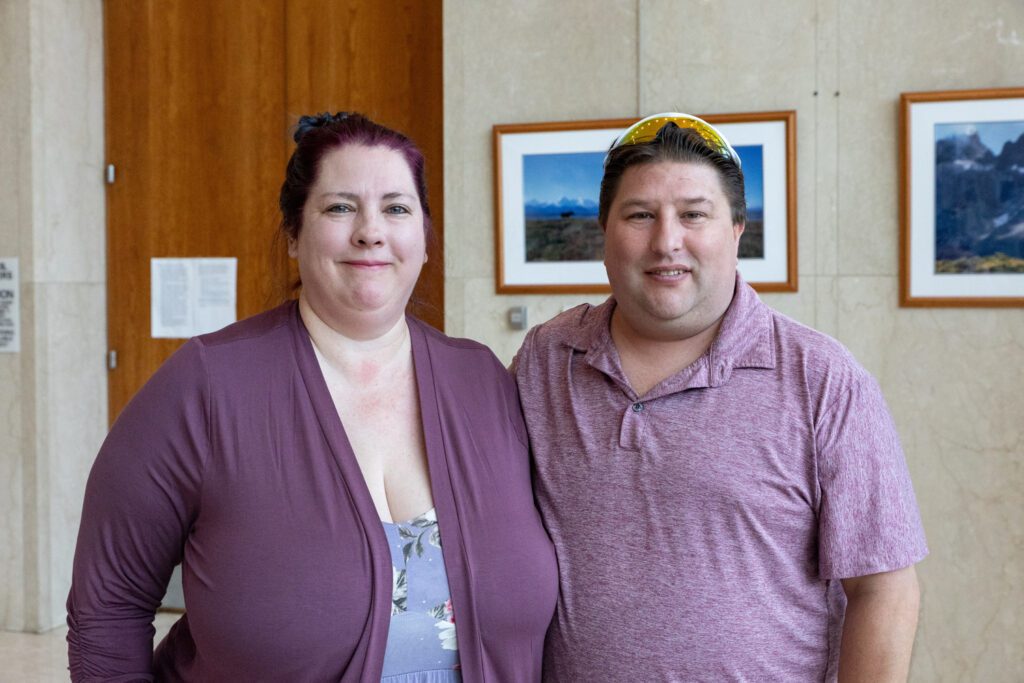
“They’ve been doing it without the zone change,” and the dust from the mining has been a significant concern for McKown’s health. “I do have asthma, and I’m now on an inhaler, a maintenance inhaler that I wasn’t on previously.
“If it’s because of that site, I don’t know. But going forward, the health implications for myself or residents around me, that’s a concern going forward.”
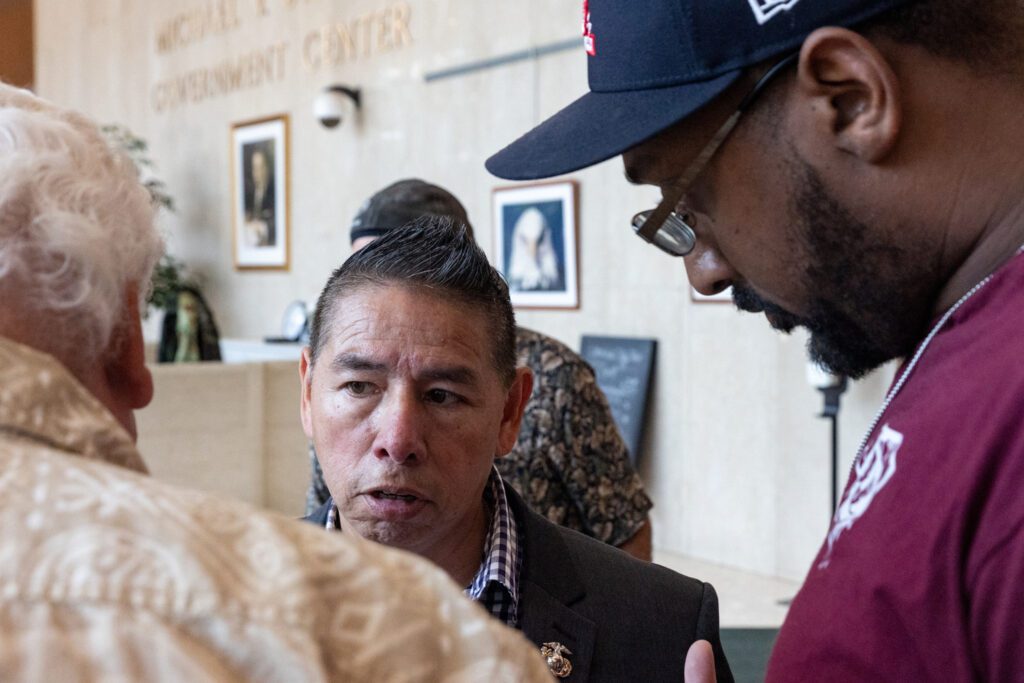
McKown and her husband said what Rocky Ridge LLC is putting into the ground and what residents are “breathing in” are of utmost importance to them.
There were three concerns brought to the attention of Toledo City council by the plan commission:
- Concern of dust from mining
- Reuse of the site after the mining
- Environmental impacts of mining
Driscoll seemed adequately assuaged by the efforts to mediate the dust with a “dust suppressant,” as Ed Moore, managing director of Rocky Ridge Development LLC, recommended. Driscoll referenced an individual who said the dust had gotten better since the use of the suppressant, but Hoag was less than pleased with the suppressant solution.
“Byrne Road’s all oil,” he said. “See, the people have complained so bad about the dust, [so] they’ve started treating that. Well, the treatment’s got oil in it. Come in off Angola, and come out onto Byrne…it’s an oil slick, basically. You can smell it. It’s not good.”
Regardless, the two council members who seemed most undecided on the issue were Driscoll and McPherson, who were very concerned about the size of the rezone (60 acres) and its viability for reuse.
“I asked them, could the property be used after this project is done for agriculture, farming?” McPherson said, but relayed that there were slightly different answers given to her by different sources.
Then came the issue of the signatures opposed to the industrial development, which she said she checked to make sure they were from residents of the City of Toledo.
She confirmed the signatures were from Toledoans, which also gave her pause.
“How does that [mining] affect those that live around there? How will it affect them? Will it affect the water around there? Will that dust and all of that, will that affect the people around here?” she questioned hypothetically, and added, “When you ask the question, then you get two different answers. Now, I got to go back, so we’ll look into it.”
Driscoll confirmed the ordinances could not be held indefinitely because it would not be fair to residents or Rocky Ridge LLC, but could not say when the ordinances would be voted on.

Maumee recall: ‘They are not listening’
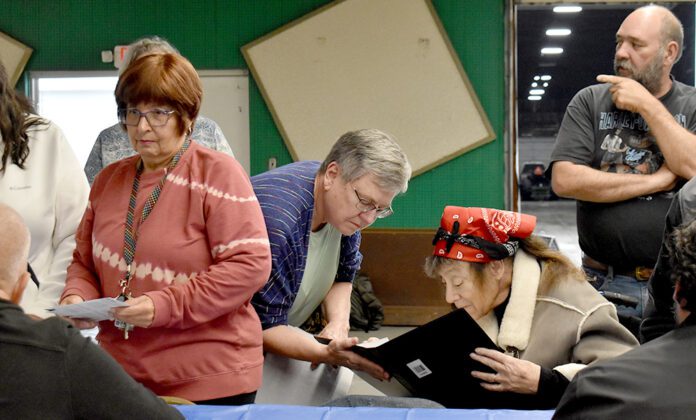
MAUMEE — Rain puddled between lines of parked cars at the Lucas County Fairgrounds as residents walked past RECALL yard signs stuck into the soggy ground and shook off water from their umbrellas as they filed into the Green Barn.
Despite the dreary weather, the crowd came out in force on May 21 for one reason – to sign the petitions of candidates who aim to replace the current Maumee mayor and six of the seven city council members.

What residents say began as backlash over a controversial sewer ordinance has grown into a full-fledged movement to recall Mayor Jim MacDonald and council members Gabriel Barrow, Scott Noonan, Margo Puffenberger, Josh Harris, Jon Fiscus and Ted Kurt. Their critics say the council has consistently ignored public input, pushed through emergency legislation and deferred too much authority to city administrator Patrick Burtch.
The only council member not being recalled is Philip Leinbach. Maumee residents, like Sherrie Schunck, say that Leinbach was the only city council member who took the initiative to have meetings with the citizens when the sewer issue first hit.
“[They] are not listening,” Schunck, supporter of the recall, said of the city’s officials. “They have their own agenda that is not acceptable…to spend money on fencing when we have issues like sewers, water that keeps going sky high.”
Schunck worries that residents like her will not be able to keep up with skyrocketing costs. What she refers to is a now-repealed sewer ordinance that many residents say imposed unexpected financial burdens on Maumee homeowners and was passed with limited discussion.
She is not alone.


Dana Johnson, one of the organizers of the recall effort, said the final straw was the June 2024 sewer ordinance, which he described as “one of the worst laws ever made.
“I started seeing some disturbing patterns in government, what I would consider government abuse, abuse of power, going back as far as three years,” Johnson said. “If it was just one or two isolated incidents, you know, I’d get it. But we see a repetitive pattern where the decisions they make and how they make them are just hurting way too many people. And when people speak up about it, they are dismissed.”
The citizen-led recall effort, spearheaded by Maumee Patriots and the Maumee Citizens for Common Sense group, began over a year ago. The first of two recall candidate meet and greet events occurred on May 21, six weeks after city council member Ted Kurt yelled at a disgruntled resident, as reported by WTOL.
Half a dozen candidates met with residents at the Lucas County Fairgrounds to collect signatures for their petitions to run in the recall election in September, should the Ohio Supreme Court move forward with it. The city of Maumee asked the court to block the recall effort of six council members and the mayor in April after the Lucas County Board of Elections voted in March to certify recall petitions.
Seven individuals are preparing petitions to be on the ballot in September:
- Rosemarie Barciz for council member
- Isiah Gonzalez for council member
- Gina Hughes for council member
- Andrew Huyghe for council member
- Dave Ross for council member
- Scott Sund for council member
- Chelsea Ziss for mayor
Dave Poeppelmeier, who lost his first run at city council two years ago, is running again for a seat in Maumee’s general election, as well, citing transparency issues and city administrator Burtch as motivators to return.
Not everyone in Maumee supports the recall. Jim Stengle, who serves on the UNITE Maumee leadership committee, believes the effort is an overreaction.
“My point is…this public leadership? They stub their toes. Sometimes they break some China along the way. All right, they make some people mad,” Stengle complained about those in office. “What you don’t see happening anywhere in the country is somebody coming in and saying, okay, the way we fix this is by pushing the nuclear button and completely blowing up government.”

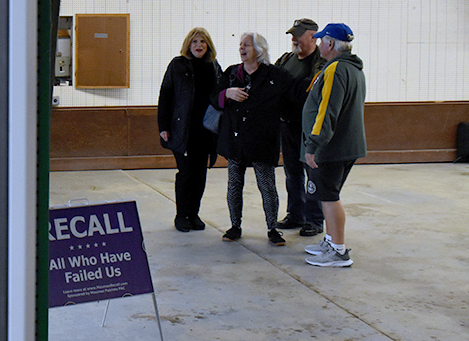
Josh Harris, who is one of the six current council members being recalled, says he has tried to be transparent and available to the public by handing out his cell phone number.
“When I see people posting things,” Harris stated, regarding social media posts. “I’m saying, ‘Hey, you know, you seem to have some questions. I’d be more than happy to speak with you. Here’s my number.’ But honestly, no one calls.”
Harris claims he had only five people call him in his three years on council. His phone number is not listed on the City of Maumee website but he shared it with the Toledo Free Press, urging people to “call me.” He can be contacted at 419-351-5091 or at jharris@maumee.org.
None of the current city council members have phone numbers listed on the Maumee City website. Also, the Maumee city’s contact page gives 911 as the only contact with an email form below.
As a city council member, Harris claims he does not have a working relationship with Burtch — the city administrator with whom the supporters of the recall cite their frustrations —saying, “he’s just basically there to advise any questions that we [Maumee City Council] may have.”
Ziss, a mayoral candidate in the recall election, said she was compelled to run because she believes Maumee residents deserve more transparency and accountability, which, for her, “is telling people why you’re doing what you’re doing” and “explaining how it turned out.
“I’m not afraid to admit mistakes. I’m also not afraid to disagree. But I also don’t take it personally if somebody disagrees with me, and I think that’s a really important thing.”
Chelsea Ziss
Chelsea Ziss believes that while everybody wants to feel heard by their elected officials, that is not what is happening in Maumee. “What has been happening, or what people feel have [sic] been happening, anyway, is that they’re just kind of following the leader or being totally apathetic, and I don’t even know which one of those is worse.”
Poeppelmeier, a candidate for city council in the general election, is aligned in thought with Ziss. “I think I can listen to people and give better guidance,” Poeppelmeier said. “The thing that made me finally run again was our city administrator, Patrick Burtch.”
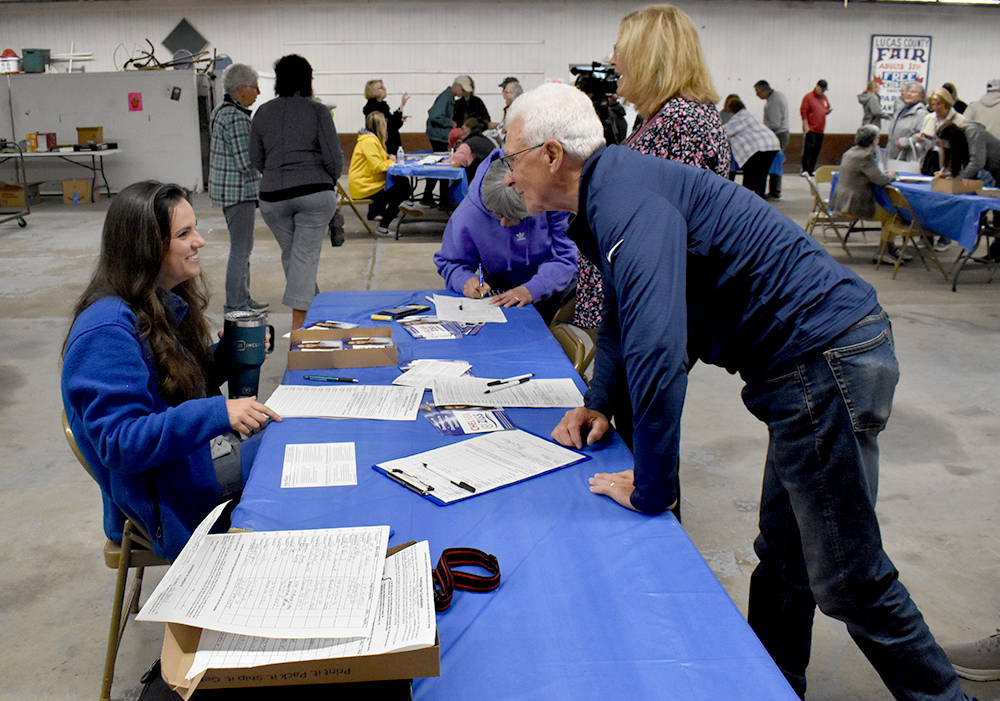
Ziss claims the current council wanted to pass an ordinance that would temporarily remove all spending restrictions for the city administrator. She continued to say that Burtch can already spend $75,000 without council approval, which is another concern for her regarding lack of transparency from the current city council.
While Unite Maumee members can admit faults on behalf of the current city council, they say that lack of accountability and transparency is not one of them.
“The city has made a lot of efforts to become more transparent,” Alex Schrinel, Unite Maumee leadership member. “There were legal issues with televising city council meetings. They figured all that out, and now they’re live streamed.”
Schrinel and other Unite Maumee leaders say that the best way for residents to get their voices heard would be to attend public committee meetings, read the City of Maumee newsletter each month and go to the proper place to get information instead of relying on social media.
Jamie Tscherne, Unite Maumee leadership member, says that all meetings are public, excluding executive sessions, and that residents are not taking advantage of the opportunity.
This echoes council member Harris’ sentiments urging constituents to “become educated” and “make sure you reach out and ask questions.”
Regarding spending, Unite Maumee says there is a plan to improve the community, such as continuing to upgrade the whole city, sidewalks, neighborhoods, safety and schools.
Tscherne noted that the current city council was already successful in updating uptown.
“Right now, there’s been $350 million of public and private investments in this community in the last few years,” Stengle said. “There’s another $500 million that’s already been announced. Right now, one of the fastest ways to blow that up is to blow up the city government.”
If the Ohio Supreme Court approves the recall, candidates will need 431 signatures to appear on the Sept. 9 special election ballot. Under Ohio law, recall petitions must be signed by a number of people equal to 15 percent of the votes cast in the most recent municipal election. That number in Maumee is 431.
Although it is not yet certain whether the recall election will proceed, both supporters and opponents are preparing for a pivotal moment in Maumee’s political future.



















